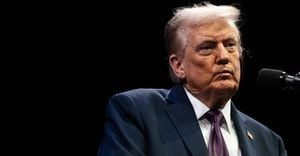The tech industry finds itself at yet another crossroads as Donald Trump reclaims the presidency, igniting discussions about deregulation, innovation, and the future of technology governance. With companies like Tesla and SpaceX on the forefront, the potential impacts of Trump’s governance on tech regulation and innovation are wide-reaching.
Under previous administrations, particularly during his first term, Trump's approach led to chaos and unpredictability within the tech sector. Significant controversies, such as his attacks on major platforms for perceived bias and his administration's regulatory frameworks, sparked immediate backlash from Silicon Valley. Fast forward to today, the atmosphere feels remarkably different. Unlike the initial resistance witnessed back then, many tech leaders from giants like Google and Meta are now expressing eagerness to collaborate with the incoming administration.
This newfound camaraderie among tech leaders stems from their hopes for regulatory relief as Trump steps back onto the political stage. Already, tech CEOs have lined up to offer congratulations and support, hinting at how the industry's attitude has shifted. The post-election digital flattery signals the tech sector's readiness to engage rather than resist.
One focal point of interest is how Trump’s relationships, especially with prominent figures like Elon Musk, will shape regulatory frameworks. Musk has established himself as a significant player, advocating for reduced regulation and increased support for groundbreaking technology projects. Analysts project Musk could potentially become the head of a new governmental efficiency department, positioning him paradoxically as the overseer of regulations for his own companies like Tesla and SpaceX.
This relationship not only promises to influence Tesla's regulatory environment but could also steer potential changes for the cryptocurrency market. During his campaign, Trump voiced intentions of forming favorable conditions for Bitcoin, even promising the establishment of national Bitcoin reserves. Consequently, optimistic expectations have emerged from cryptocurrency markets anticipating Trump’s friendly policies for digital assets.
The expected deregulatory environment under Trump, particularly within the cryptocurrency sphere, also raises questions about long-term impacts on business dynamics. Bradley Tusk, notable for his advocacy work with tech startups, emphasizes the need for regulatory voices more amenable to innovation compared to the rigorous stances of the previous administration. His optimism suggests the potential for more investment and acquisitions to take place as regulations ease.
Another significant implication involves Lina Khan’s anticipated exit from her role as chair of the Federal Trade Commission (FTC). Khan has been characterized as both a champion for smaller tech firms and as an adversary of larger corporations. Many view her impending departure as potentially revitalizing the market for mergers and acquisitions, offering big players like Google, Facebook, and Apple fresh opportunities for expansion without the same level of scrutiny.
Despite the optimism surrounding the anticipated changes, some analysts caution about inherent uncertainties. Questions persist surrounding how effectively Trump can navigate the complex regulatory waters of modern tech industries. Numerous states have begun implementing their own frameworks for regulating sectors like cryptocurrency, often leading to fragmentation. If the federal government becomes less involved, individual states could continue to develop their own regulations, potentially complicate the business-operational environment.
On top of regulatory uncertainties, the broader ramifications of Trump’s views on artificial intelligence (AI) and related technologies loom large. The previous administration’s fragmented AI governance left many lobbying for clearer policies. Trump's interactions with tech leaders and his approach to AI could decisively influence both development and deployment strategies among tech firms.
Current conversations hint at the possibility of dismantling established frameworks guiding AI development. Should Trump decisively abandon many regulatory frameworks set during the Biden administration, innovations may face fewer restrictions, albeit with more room for potentially negative ramifications.
While the tech industry seems prepared for changes to come, the nuances and dynamics of these alterations will require close observation. Analysts remain cognizant of the unpredictable nature of Trump’s administration. His relationships with tech innovators might shape unprecedented opportunities for favorable conditions, yet they also might birth conflicts of interest—one path compelling regulation, another urging freedom from oversight.
This invites discussions about market speculation, particularly within the realms of cryptocurrency and AI. For example, as crypto continues its evolution, the impact of Trump’s vision on shaping future regulations will significantly dictate how crypto companies operate within the U.S.
While there are expectations for increased libertarian policies toward cryptocurrency, it remains uncertain how these interactions could shift international regulatory relationships with other nations aiming to manage crypto differently.
Given the tumultuous base of Trump's initial term, the upcoming period offers both opportunities and risks for the tech industry. Predicting the exact outcome may be as elusive as the tech itself, yet the developments from this point onwards promise to reshape the tech world and federal relations for years to come.
Overall, Trump’s re-election is likely to usher technology regulation down a different path, one characterized by less oversight, more integration with state policies, and possible advancements within sectors like AI and crypto—all dependent on who he surrounds himself with within his administration. Tech companies now shape their strategies and expectations amid political transformations and potential upheaval on Capitol Hill. The future remains uncertain yet teems with possibilities as this new chapter begins.



